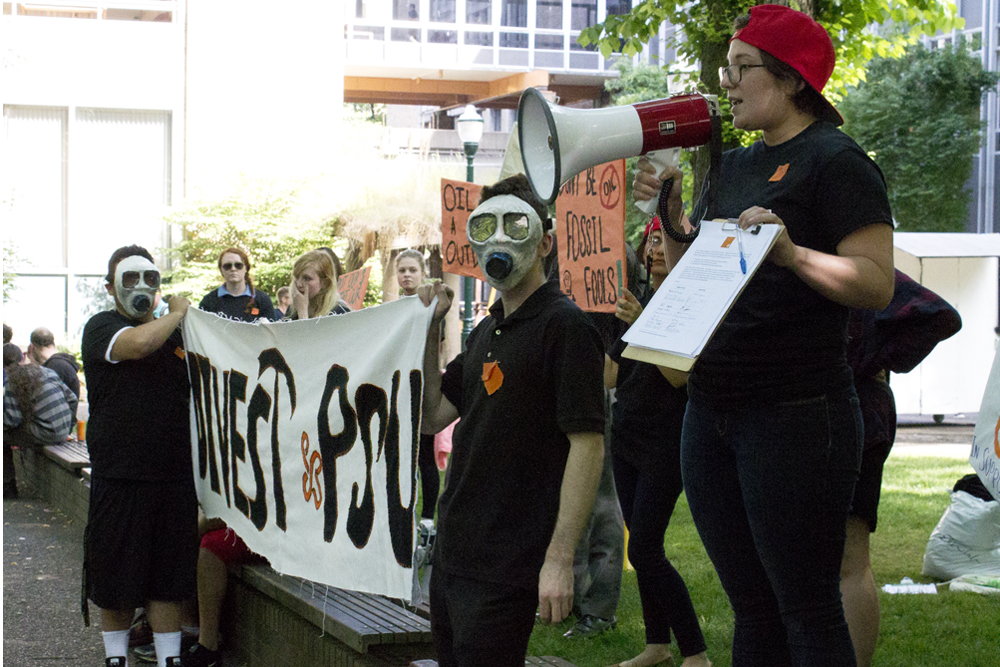Divestment is a word floating around many institutions as a potential strategy for combating fossil fuel production and the resulting environmental impacts. The City of Portland and Multnomah County have already made commitments to divest from fossil fuel companies, and a group of student activists have taken steps to bring Portland State on board.
That student group, known as Divest PSU, has collaborated in the past year with the Associated Students of PSU, divestment groups at Reed College and University of Portland, and a still-greater regional movement to raise divestment awareness across campus. So far, its efforts seem to have captured the attention of university officials.
“Divestment has this negative connotation with it, but it’s a reinvestment in our future,” said Elyse Cogburn, outgoing Divest PSU organizer and former ASPSU Sustainability Affairs Director.
“It’s a reinvestment into the university,” Cogburn continued. “It’s a way to advertise that we are sustainable, and I can guarantee that more donors are going to look at that.”
The act of divestment refers to pulling an institution’s investments away from financial vehicles supporting the target of a given divestment movement—in this case, fossil fuel producers.
The PSU Foundation, an autonomous nonprofit organization handling the endowment that goes into supporting PSU scholarships, currently directs several millions of dollars in investment money to maximize donation earning power. The Foundation recently explored the divestment question at the request of PSU President Wim Wiewel.
At the end of spring term, Paul Carey, PSU Foundation Chief Financial Officer and Associate Vice President of Development, said 1.5 percent of the Foundation’s endowment portfolio investments are in fossil fuel–related companies.
“Evaluation of Socially Responsible Investments,” a January 2015 report released by the Foundation, read, “Fossil Free Indexes created The Carbon Underground 200, a list of the top 100 public coal companies and the top 100 public oil and gas companies globally. The PSU Foundation portfolio currently has a 1.34 percent exposure to companies on this list, with 1.2 percent attributed to oil and gas companies and 0.23 percent attributed to coal companies.”
But how much investment in fossil fuels is too much? Divest PSU is arguing against any form of support for fossil fuel companies. Furthermore, the group asserts that over 80 percent of students support fossil fuel divestment, citing a survey conducted by ASPSU that gathered data from 231 PSU students, staff and faculty members.
Wiewel also expressed support for university action on the divestment question, though he declined to suggest a specific solution, leaving it to the Foundation to decide. But he acknowledged the university’s mission to be a leader in sustainability and pointed to a need for the Foundation to find a balance between PSU’s mission and goals and the Foundation’s earning power.
“Given our focus on sustainability as a key hallmark of the institution, I felt very clearly we can’t just do what some other universities have done, which is to totally say we’re not going to do anything, we’re just purely looking at maximum return, and we’re not going to have any constraints on that,” Wiewel said at a May 22 press conference with Student Media.
“At the same time,” he continued, “return does matter.”
The Foundation manages funds with a goal of seeing returns on investments, and while the Foundation’s Board also acknowledges the university’s sustainability goals, it aims to maximize university goals against a variety of factors. Wiewel pointed out that strength of return will factor into any Foundation decision, as donors expect to see their support maximized.
“Donors give us money to generate money to support students,” Wiewel said. “Most of it’s for scholarships.”
Still, Wiewel has supported Divest PSU’s voice in the conversation, a fact Divest PSU members acknowledge. The president has also played a role in facilitating the Foundation’s consideration of PSU’s leadership in sustainability practices. He also left room for the Foundation to determine how to define that role in their investment decisions.
“What the precise right answer is, whether it’s direct divestment fully, or a more proactive investment and socially responsible investing, [the Foundation needs] to work out what [they] think makes sense or what the pros and cons are,” Wiewel said. “I have not told them it has to be precisely this, it’s not my role. It’s theirs to figure out.”
Divest PSU
Divest PSU began its work last year with the help of 350PDX, a citywide climate activist group. 350PDX brought Divest PSU together with student groups from other campuses around the city, including Reed and UP, according to 350PDX divestment team member Zach Allan.
“We’ve been trying to keep an eye out for what divestment movements are happening in colleges around, and trying to support them,” Allan said. “I’ve been with [Divest PSU] over the last year. There’ve been some trainings, and we’ve got the 350 group to bring them out of town for the training.”
Allan noted that the students largely handled the training, saying that 350PDX has been mostly confined to helping with organization.
“We just helped facilitate the group that was doing it,” he said. “It was focused on leadership, building a really strong team and a team that has emotional support, and not just a hierarchy.”
The PSU activists hosted a panel discussion during winter term, which included Allan, Divest PSU organizer Linda Hoppes, faculty and other sustainability figures. The discussion focused on raising awareness of the divestment option. Allan noted that attendees seemed largely in support of the idea.
“I think the panel went really well,” he said. “I was expecting there to be a lot more pushback or for people to be confused about the idea. Everyone seemed to almost [wonder] why aren’t we already divested.”
Divest PSU followed up with a series of awareness-raising events, such as tabling on the Park Blocks during Earth Day. They also supported other related social justice events on campus, including Students United for Palestinian Equal Rights and the PSU Student Alliance for Sexual Safety, through social media outreach.
Wiewel asked the Foundation to meet with the Divest students. The Foundation provided Divest PSU with its January committee report concerning the divestment question. It also arranged a Foundation member as a liaison between the Foundation and students. Divest PSU organizer Alfredo Gonzalez said Foundation liaison Becky Hein initially met with the students in late January.
But contact with the Foundation floundered after Hein resigned from her position in April. The Foundation arranged for Divest PSU to contact Carey for future inquiries, according to Gonzalez, but the students claim all subsequent inquiries have gone unanswered.
Carey spoke with the Vanguard at the end of spring term, but has not responded to recent requests for further comment.
Event X
“[The Foundation has] monthly meetings, and none of them have been inclusive of us or our image,” Gonzalez said. “I think that’s wrong, because Divest [PSU] is serving a community of 81 percent of the people who think that we should divest from fossil fuels,” he continued, citing results from ASPSU’s divestment survey.
The lack of contact led Divest PSU to plan its first protest action, which it called Event X. The students rallied a group of demonstrators to crash PSU’s annual Sustainability Celebration to signal their opposition to fossil fuel investments.
“It led us to move forward and put some pressure on [Wiewel] and the PSU Foundation,” Gonzalez said. “We all went and basically staged an oil spill in front of the crowd celebrating sustainability.”
The protesters, who said they had spent much of their work to that point in cooperation with the administration, were met with applause by those in attendance at the celebration. They staged a silent demonstration, raising fists and holding signs as Gonzalez quietly confronted Wiewel to ask for action on the divestment question.
“It was beautiful,” Hoppes said. “I think it was really powerful, and I think it got a lot of people’s attention. What a great idea that the group came up with this.”
Gonzalez also expressed gratification with the response and effect of Event X, noting that he and Wiewel exchanged contact information with the promise of another meeting to come. Weeks before the protest, Wiewel also expressed an interest in ensuring a further meeting would occur.
“I’ve asked them to meet with me since we asked the Foundation to look into this,” Wiewel said at the May 22 press conference. “So I’ve asked them to meet with me and let me know, ‘What are you recommending for the Foundation?’”
That meeting, initially scheduled loosely to occur during spring term finals week, has been reset for late July. Divest PSU has also pointed out that the Foundation has yet to respond to their inquiries directly.
“When it comes to the Foundation and convincing the Board [of Trustees], it’s going to be a money game,” Cogburn said.
She added that the Board has failed to take students’ opinions into consideration this past year, citing the issues of arming campus safety and raising tuition as examples.
“They’re all very much business men, with money on the mind,” she said. “In my opinion, that’s what we have to focus on, the actual return of it, to kind of make it more desirable.”
Pushback and changes
Though the Foundation has offered minimal comment to either Divest PSU or the Vanguard, its committee submitted an initial report on their investigation into the divestment question in January. The report, titled “Evaluation of Socially Responsible Investment Strategies,” pointed to a range of options, including doing nothing, divesting from fossil fuel companies, integrating Environmental, Social and Global (ESG) strategies, impact investing and creating a separate Socially Responsible Investment (SRI) fund.
“Socially responsible investments are basically an alternative to fossil fuels,” Gonzalez explained. “So you can invest in a company that is growing still, but they’re not doing it in a way that is destroying something, paying low wages or something.”
The report delayed a recommendation until further investigation, though the language seemed to favor integration of ESG strategies, pointing largely to the challenges provided by other options. ESGs are generally regarded as more flexible than SRIs, which hold investments to a socially responsible standard.
“They always seem to be leaning toward ESGs, which is always a red flag to me,” Gonzalez said during a subsequent Divest meeting. “Why are they leaning toward that versus SRI?”
Gonzalez also took issue with the Foundation’s investigation committee, pointing out that the investigators essentially took information directly from J.P. Morgan, the bank that currently handles Foundation investments. He also pointed out that several members of the committee are affiliated with Northwest Natural, a local natural gas producer. The Foundation’s Executive Vice President of Operations and Regulation serves as the committee chair and is affiliated with Northwest Natural, according to the Foundation website.
“That committee is made up of different individuals,” Gonzalez said. “One of them is from Northwest Natural, which is clearly a conflict of interest.”
Northwest Natural declined to comment on the question of divestment and their role in the Foundation and PSU investments.
Going forward
Divest PSU will suspend much of its operations over the summer while preparing for the July meeting with Wiewel and the Foundation, according to Gonzalez. In the meantime, he noted they will prepare training sessions for the coming year, with a mind toward the recruitment of incoming students to join their fight. With a final decision likely to be made in September or October, Divest PSU is looking at the summer as an opportunity to regroup.
“I think we are all waiting a little to let the dust from the spring term settle,” Gonzalez said in a recent email. “There will be trainings happening, and getting together with new members for [Divest PSU] as well as senators from ASPSU, community partners from 350PDX…just not being planned right now.”
The students are ready to carry the fight into the coming terms, but their impact on Foundation decision-making remains to be seen. Allan said 350PDX will continue their partnership going forward and credited the students for their efforts.
“When I’ve been out with [members of Divest PSU], it seems like everyone is really supportive of the idea,” Allan said. “Students did a great job of promoting. They’ve done a really good job strategizing, too.”
Allan also pointed to the bigger picture. Not only have the city and county started making commitments against fossil fuel investments, universities throughout the nation are starting to confront the question. Some, such as the University of Washington in Seattle, have already made commitments of their own, often with the support of student groups like Divest PSU.
“It’s kind of the time where you see divestment coming up at other universities and around the world as a topic,” Allan said. “I think it’s really good timing.”
More information about Divest PSU can be found at facebook.com/divestportlandstate. More information about the PSU Foundation at pdx.edu/giving/PSU-foundation.







